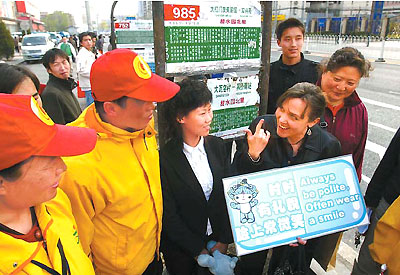I was inching towards the immigration counter at London's Heathrow Airport two weeks ago when an officer who had been querying a Chinese passenger suddenly raised his voice and asked if there was anybody in the line who could speak good English.
 A foreign language instructor helps Beijing residents get to grips with English. [China Daily/File Photo]
A foreign language instructor helps Beijing residents get to grips with English. [China Daily/File Photo] |
I volunteered to help. It turned out that the young officer needed to know only three things from the passenger: the purpose of his visit, how long he would stay and what his occupation was. As neither spoke the other's language, a deadlock had ensued and the tension was palpable.
Later as I rode the Tube into London, host of the 2012 Summer Olympics, I wondered why the officer posted at the arrival area for Chinese guests was unable to speak a lick of Mandarin. One may of course argue that English is much more of an international language, but this doesn't give people from an English-centric culture any reason to be less accommodating to people who speak in a less familiar tongue.
Which has made me appreciate all the more the painstaking efforts of the Beijing airport police to learn to speak a foreign language and flash new arrivals their toothy smiles.
To be fair, some degree of multilingualism can be found in a number of well-known British tourist attractions such as the Roman Baths or Houses of Parliament. The staff there may not speak a foreign language, but they have compensated by providing electronic audio-guides in museums or brochures in many languages including Chinese, Japanese, Korean and Arabic at the House of Commons and House of Lords.
Yet these efforts still pale in comparison to Beijng's campaign to go multilingual.
At the moment, organizers are focusing on a two-pronged strategy to improve the language skills of the general public: they are seeking volunteers with a greater diversity of languages on the one hand and promoting more fluent English conversation on the other.
From next month, Beijing will recruit more Olympic volunteers who are able to speak one of 55 languages including English, French, Spanish and Arabic.
Dozens of students from a local language university have already been sent to Havana on a four-month Spanish immersion program for the Beijing Olympics. Meanwhile, hundreds of retired Chinese diplomats who were formerly stationed overseas have reportedly been invited to translate for the athletes or telephone operators.
According to an official survey, more than 90 percent of prospective Olympic volunteers have declared English their first foreign language, at the basic conversational level and above. But organizers would like them to speak better.
As the bar continues to rise, even Gong Li, an internationally-acclaimed Chinese movie actress whose character spoke English with a Cuban accent and some Spanish in Miami Vice, says she is not sure about her English even though she wants to volunteer for the Olympic Games.
"I think I can be a volunteer for one of the supporting services, or I may become an interpreter," she says. "But I don't know if I am qualified. I can communicate with American and British people. But when it comes to the English with other accents, I have no confidence."
For most of us, learning a foreign language remains a daunting and time-consuming task. My only concern for the current language-training drive is that organizers should have realistic goals and make the language services more innovative. For example, basic conversational skills backed by sufficient electronic and print information should help people to effectively communicate with international visitors.
Now back to the scene at Heathrow. It might not have taken place if the Chinese tourist could also speak some simple English.
Email: yuanzhou@ chinadaily.com.cn